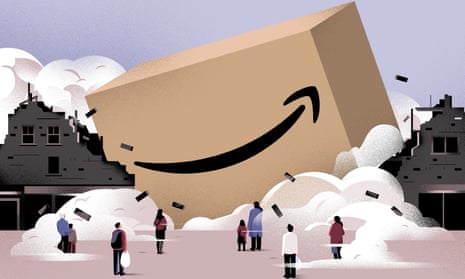What will happen to the high street now? After long years of decline prior to the pandemic, the sense of inevitable disaster is becoming overwhelming. Pick your place, and the headlines will tell you most of the story: “Further blow for East Kilbride as Marks & Spencer confirm closure of flagship store,” reports the Scottish Daily Record, adding that the news came “just days after Zara announced it would leave … with Boots stores in the town under threat and a number of restaurants having closed”.
The sadness of the stories seems all the greater when you read about the thriving trade based around brown parcels adorned with stylised smiles. Traditional shops may be in free fall, but since the start of 2020 the worth of the Amazon empire is reckoned to have increased by more than half, to an astonishing $1.49 trillion (£1.1tn). Last Thursday, it announced quarterly sales that were up 40% on the same period last year.
Much of this has been driven by what the pandemic has done to people’s buying habits, and a share of the e-commerce market now put at 44% in the US and about 30% in the UK. But also relevant is Amazon’s Web Services division, which has cleaned up as companies have shifted more of their activities to the online cloud.
For Jeff Bezos, who founded the company and owns 11% of it, the upshot is yet another jump beyond the limits of earthly wealth and influence. His is a gigantic, omnivorous kind of capitalism that makes past pioneers look tiny: on 20 July, Amazon’s skyrocketing share price meant that in a single day, Bezos’s fortune increased by $13bn – more than triple Richard Branson’s entire net worth.
Last week, when he made his first ever appearance before a committee of the US Congress – alongside Facebook’s Mark Zuckerberg, Apple’s Tim Cook, and the Google chief, Sundar Pichai – the impression was of a man secure in his position, occasionally unsettled by questions about his company’s power and alleged abuses of it, but calmly confident that the future was still his.
As shown by its newly announced plans to break into the UK grocery delivery market, and the prospect of up to 30 of its checkout-free Go convenience stores in commuter hotspots, there seems no limit to Amazon’s ambitions for retailing. It is ceaselessly expanding, both as a direct vendor and the host of a vast marketplace for other sellers that often looks like a brutally effective means of divining what products are becoming popular and then ensuring the company sells them itself (a practice that Bezos told his congressional interrogators was against company policy, though he “can’t guarantee” it has never happened).
Meanwhile, as if to suggest a corporation plucked from the pages of a Philip K Dick novel, the same giant firm that supplies millions of us with every consumer item under the sun – and that sits at the heart of many homes via its Echo devices – also delivers computing services to the CIA, Nasa, the US navy, and the US Immigration and Customs Enforcement agency.
Amazon’s sheer scale means that the effects of what it does transcend the fortunes of the company and amount to deep social transformations. For its retail customers, consumerism is no longer a matter of venturing outside the home but the lonely transcendence of ordering and then getting. Most of Amazon’s workers, meanwhile, are either shut behind windowless walls, doing the minute and monotonous tasks that punctuate the workings of machines, or frantically delivering parcels. Complaints about the company’s treatment of its employees are now a constant, but – like those about Amazon’s record on tax – they rarely gain real traction. Prior to delivery, the average Amazon package is thought to require just one minute of labour: soon enough, this will surely dwindle even further.
But if all this denotes historic change, politics has yet to catch up. Thanks partly to the nostalgic mood defined by Brexit, in the UK too many people in charge still fixate on somehow reviving traditional shops. The government’s latest proposal is an online sales tax, which would make up for cuts to business rates, thereby supposedly allowing retail businesses to survive.
In some places, such measures might have beneficial effects. The problem is that fixating on the traditional high street serves as a distraction from thinking about the workings of online business and Amazon specifically: how to challenge its vast power, monitor and regulate what happens to its workers, and manage the impact of the technology.
Some of the most incisive answers have recently come from a former Amazon insider. In May, the Amazon tech engineer and vice-president Tim Bray left its Web Services division. Incensed by the fact that colleagues who had protested about the treatment of warehouse workers during the pandemic had been dismissed, he began writing punchy blogposts focused on what ought to be done about big tech’s power.
“Amazon is exceptionally well-managed and has demonstrated great skill at spotting opportunities and building repeatable processes for exploiting them,” he said. “It has a corresponding lack of vision about the human costs of the relentless growth and accumulation of wealth and power. If we don’t like certain things Amazon is doing, we need to put legal guardrails in place to stop those things … a combination of antitrust and living-wage and worker-empowerment legislation, rigorously enforced, offers a clear path forward.”
Bray thinks Amazon needs to be broken up. He also makes the case for unionising its workers, and finally forcing the firm to collectively bargain with them. He doesn’t talk so much about the even bigger question of the effects of technology on many of the people currently working for the online retail giants. Even before the pandemic, one forecast suggested that 80% of jobs in “retail transportation, warehousing and logistics” were newly susceptible to automation; others have said that nearly 500,000 UK retail jobs could be lost to robots by 2024. In a world in which the workplace has become a byword for infection, those trends will presumably accelerate.
In the US and at the heart of the European Union, some of this is at least being discussed. Yet leaving the EU is likely to boost efforts to turn the UK into a light-touch regulatory paradise for capitalists and to encourage our national tendency to see large corporations as an uncontrollable force of nature.
“The only real constant in retail is customers’ desire for lower prices, better selection, and convenience,” Bezos told his questioners on Capitol Hill. Herein lies what is propelling us into the future, from Seattle to post-industrial Scotland: supply meeting demand. Meanwhile, politicians fail to address profound questions about corporate power, work and wealth, and a world changing beyond recognition.

